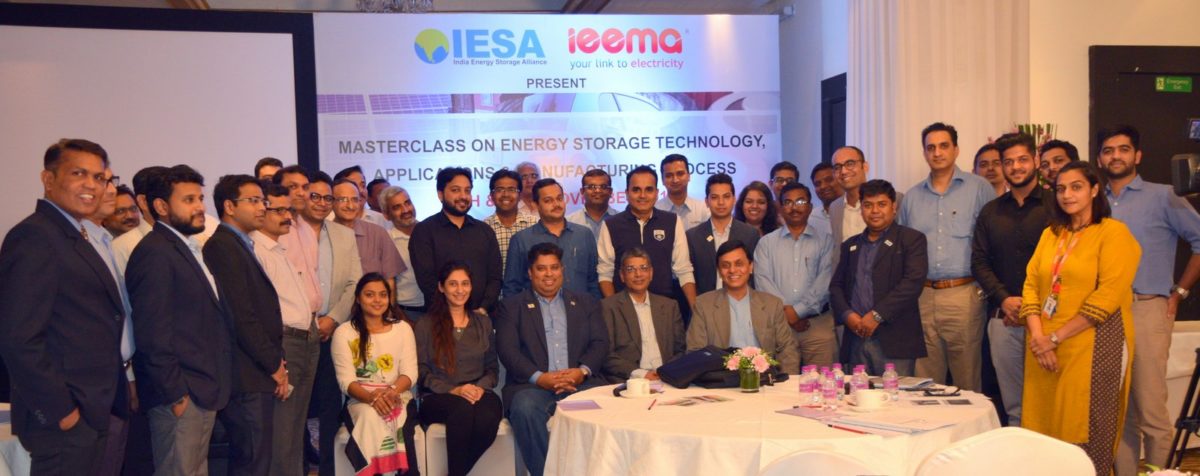The India Energy Storage Alliance (IESA), along with the Indian Electrical & Electronics Manufacturers Association (IEEMA), between November 17-18 conducted in Mumbai a two-day Masterclass on Energy Storage Technology, Applications & Manufacturing Process – the first of its kind in India.
Shreegopal Kabra, President, IEEMA, inaugurated the workshop, which was designed to make participant companies and individuals aware of leading and emerging energy storage technologies, and the status of energy storage deployments in stationary and EV applications. Overall, the unique program was designed to assist companies entering or diversifying in advanced energy storage manufacturing.
Rahul Walawalkar, Executive Director, IESA explained the different types of energy storage technologies available across the world, along with the techniques that are still underdeveloped at commercial scale. India Energy Storage Alliance has estimated the market opportunity to be 50-70 GW (i.e., 150-200 GWh regarding energy requirement) by 2022.
Opportunities for energy storage in India cover the full range of applications, including grid-scale energy storage for optimizing transmission and distribution investments. Additionally the topic covers enabling renewable energy integration, to provide energy access through microgrids to over 20 crore people, and to supply batteries for the ambitious electric mobility program, under which India is targeting to only sell EVs by 2030. These opportunities are expected to attract investment in 2-4 GW-scale factories for advanced Li-ion batteries in India, drawing over $3 billion in the next three years.The event also provided insights on designing energy storage for different applications.
Manjunath Rao, Standards & Program Manager from UL, examined the different types of standards for stationary energy storage required, and shared the draft BIS standards for energy storage that will be adopted in India over the next six months. Further, the workshop also provided insights on grid applications of energy storage and an overview of regulatory initiatives.
Much like India’s PV manufacturing sector, domestic capabilities for energy storage are lacking. In one presentation, Sivaguru Paramasivam, Manager-Energy storage solutions at Delta Electronics, has explained in detail the battery manufacturing from cells to modules to the container, highlighting the issues and solutions required to resolve them.
Government support is essential for such initiatives, more notably because India has pledged to plow a greener path with 175 GW renewables by 2022, under which there remains a distinct lack of policy framework for energy storage. H. Purushotham, the Chairman and MD, National Research Development Corporation, an Enterprise of DSIR, Ministry of Science & Technology, explained how government can support new technologies and help entrepreneurs achieve their dream through technology acquisition and ingress protection.
Such insights and government programs can help Indian companies in setting up manufacturing as well as acquiring technology and intellectual property rights.
Hence, the event also addressed the critical aspects of any business; that is, financing and connection to the government. In the concluding session, the workshop discussed where India fits in the global storage supply chain, and explored key decision factors and risks when venturing into new market segments of storage, microgrids, and EVs.
The attendant experts explained the complete range of energy storage technologies available, including advanced lead acid, Li-ion batteries, flow batteries, flywheels, ultra-capacitors and other emerging technologies. The 2nd edition of the workshop will take place in April 2018.
This content is protected by copyright and may not be reused. If you want to cooperate with us and would like to reuse some of our content, please contact: editors@pv-magazine.com.








By submitting this form you agree to pv magazine using your data for the purposes of publishing your comment.
Your personal data will only be disclosed or otherwise transmitted to third parties for the purposes of spam filtering or if this is necessary for technical maintenance of the website. Any other transfer to third parties will not take place unless this is justified on the basis of applicable data protection regulations or if pv magazine is legally obliged to do so.
You may revoke this consent at any time with effect for the future, in which case your personal data will be deleted immediately. Otherwise, your data will be deleted if pv magazine has processed your request or the purpose of data storage is fulfilled.
Further information on data privacy can be found in our Data Protection Policy.